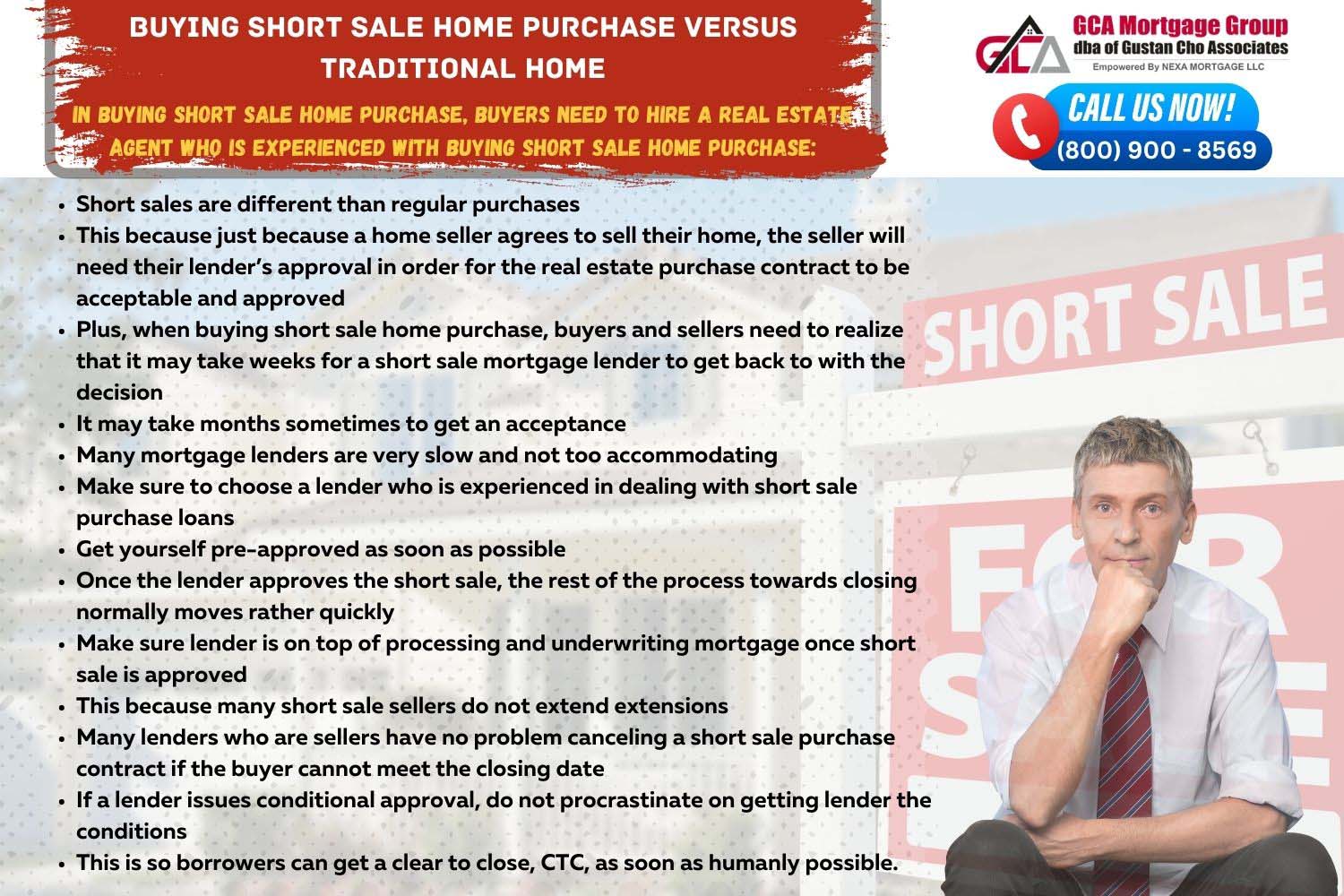Buying Short Sale Home Versus Traditional Home Purchase
This article will cover buying short sale home purchase versus traditionally listed homes. A short sale is when a homeowner has a home with a loan balance that is higher than the value of their home and gets their lender to agree for them to sell their home at a discounted price. The discounted prices lower than their mortgage balance is a short sale transaction.
The financial crisis of 2008 has affected housing in every city, county, and state of the United States. Short sales were an alternative to foreclosure. Lenders did not want to keep housing inventory and rather take a loss and get the property off their books. A short sale is when a lender discounts the mortgage note so the property gets sold below what the home is owned.
Short sales have been around for a long time. It did not skyrocket until after the real estate and credit disaster of 2008. The Great Recession of 2008 devastated the real estate market nationally. The collapse of real estate values impacted every county in America. In some areas of the United States, real estate values dropped by more than 50%.
How The 2008 Financial Crisis Affected The Housing Market
Many parts of Illinois, Florida, California, Washington, Texas, Georgia, Michigan, Arizona, Maryland, Iowa, Ohio, Louisiana, Indiana, and Wisconsin were greatly affected. Bankruptcy and foreclosure rates have reached historical highs. Millions of small businesses closed their doors or downsized, and they had to lay off millions of tenured workers.
Many veterans, hardworking Americans, were let go from the jobs they had held for years, if not decades. They could not find comparable jobs. They had to settle for jobs that they were overqualified for. They settled for making a fraction of what they used to make. Others remain unemployed even after the Great Recession of 2008. Have given up looking for jobs and are barely making ends meet by living with family or working temporary jobs for minimum wage. Yet others went back to school to learn a new trade.
After graduation, they cannot find employment. This was because the employers were looking for younger graduates whom they could pay apprenticeship wages. I know dozens of friends who returned to college after the Great Recession of 2008. This was because they lost their jobs. Many were in their 40s and 50s and graduated at the top of their class. However, after graduation, they could not find employment. The employer hired younger college graduates with lower grade point averages because of their age. Age discrimination does exist folks.
Impact of the Great Recession and Real Estate Meltdown of 2008 on the Mortgage Markets
It is common sense that if a family’s household income drastically reduces, they cannot afford the mortgage payment frequently. Most homeowners’ mortgage payments are about half of their monthly gross income. So if monthly income gets reduced by 50%, making mortgage payments will be next to impossible. Many homeowners lost most or all of their equity in their homes. Dale Elenteny of Gustan Cho Associates remembers the 2008 real estate meltdown like yesterday. This is what Dale said:
Many had upside-down mortgages and contacted their lenders to see if there was an alternative to foreclosure. One of the alternatives to foreclosure is a short sale. A short sale is where the lender agrees for the homeowner to sell their home at a price lower than the loan amount owed. Thousands of homeowners opted for the short sale route to avoid a regular foreclosure.
Many homeowners believed going through a short sale was better for their credit than a foreclosure. Unfortunately, that is not correct. The Fair Isaac Corporation (FICO) views a short sale the same as a foreclosure when calculating consumer FICO credit scores. Most lenders will approve a short sale with no questions asked. This is because a lender will save time and money by opting for a short sale than the time and money it takes to foreclose on a home.
Short-sale homes normally sell much more than a foreclosed home for the mortgage lender who owns the property. Homes that are being short sale are generally in good shape. This is because the homeowner still lives and cares for the home until the date it is sold. Foreclosed homes can be vandalized and stripped of kitchen cabinets, fixtures, plumbing, etc. The homeowner gets to choose the listing real estate agent for a home under a short sale.
Buying Short Sale Home Purchase
Once the lender agrees to a short sale request, hiring a real estate listing agent is the next step. Short sales are different than traditional real estate sales. The real estate agent should have knowledge and experience with short sales.
When buying a short sale property, seek out realtors who have extensive experience dealing with lenders who own the short-sale property.
Homeowners and home buyers will not want a rookie real estate agent who has never had experience with short sales representing them. The real estate agent should have had at least half a dozen short-sale transactional closings. They should understand the difficulty of working with the sellers and the lender.

Hiring Real Estate Agent on Buying Short Sale Home
In buying short-sale home purchases, buyers need to hire a real estate agent who is experienced with buying short sale home purchases. Short sales are different than regular purchases. This is because a home seller agrees to sell their home. The seller will need their lender’s approval for the real estate purchase contract to be accepted and approved. Plus, when buying short sale home purchase, buyers and sellers need to realize that it may take weeks for a short sale mortgage lender to get back to you with the decision.
It may take months sometimes to get an acceptance. Many mortgage lenders are very slow and not too accommodating. Make sure to choose a lender experienced in dealing with short sale purchase loans. Get yourself pre-approved as soon as possible. Once the lender approves the short sale, the rest of the process toward closing normally moves rather quickly.
Make sure the lender is on top of processing and underwriting the mortgage once the short sale is approved. This is because many short sale sellers do not extend extensions. Many lenders who are sellers have no problem canceling a short sale purchase contract if the buyer cannot meet the closing date. If a lender issues conditional approval, do not procrastinate on getting the lender the conditions. This is so borrowers can get clear to close CTC as soon as humanly possible.
Is Buying Short Sale Home Purchase Bargains?
Many home buyers gravitate towards short sale homes and foreclosures. This is because they assume short sale homes and foreclosures are bargains. That is not true. Yes, buyers can get a great bargain on short sale homes and foreclosures, but that is not always true.
Before a short sale seller/lender approves a listing price, they do their due diligence. They will consult with professional realtors and appraisers as to the market value of the subject property. Lenders will not give properties away and will list them on the market property.
Buyers may get below market price if the short sale home has been listed on the market for a long time. Do not expect to get a major bargain on a short sale property if the home is freshly listed on the market. Sellers of short sale homes will likely not repair the home as a contingency of the real estate purchase contract and will sell the property as is. Don’t expect the home seller to replace the carpeting or repaint the home. Most likely, buying short sale home will be purchasing the home in as is condition.








